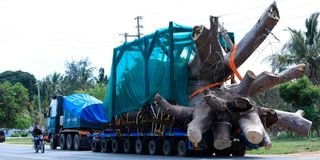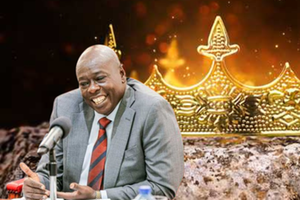8 baobab trees exported from Kenya to a botanical park in Georgia die

An uprooted baobab tree ready for export to Georgia is transported along the Mombasa-Malindi Highway in this photo taken on November 20, 2022.
What you need to know:
- Former Georgia Prime Minister Bidzina Ivanishvili was behind the purchase and export of the medium-to-large deciduous trees.
- The administration of the park published a statement asserting that a local political party and its controlled media were against the botanical park, which was opened in 2020 with funding from Mr Ivanishvili.
All the eight Baobab trees imported from Kenya to a botanical park in Georgia Country have died.
The giant trees that were sourced from Kilifi County were bought by George Gvasaliya, a Georgian entrepreneur, nature lover and environmentalist, in 2022 through the Ariba Weeds International Company to establish a botanical garden.
Gvasaliya exports Baobabs— Africa’s largest, oldest and most mythical trees— to botanical gardens all over the world.
Former Georgia Prime Minister Bidzina Ivanishvili was behind the purchase and export of the medium-to-large deciduous trees.
The administration of the park published a statement asserting that a local political party and its controlled media were against the botanical park, which was opened in 2020 with funding from Mr Ivanishvili.
"They are persistently trying to destroy this unique initiative, along with its author and implementer. This is exactly what happened during the transplantation of some baobab trees from Kenya,” reads a statement posted in an article by Georgian News on Friday August 9, 2024.
The statement said as soon as the matter became public, hidden politicians and their so-called non-governmental organisations launched an ideological battle against the project.
“Due to their false eavesdropping and alarmist complaints, the process of transplanting the plants, which was conducted in full compliance with the law, was significantly delayed,”.
The statement further claims that leaders of the party, now in opposition, launched a smear campaign and made endless phone calls to senior officials in Kenyan government to derail the export.
To hinder the process, the statement says, false hired experts were called in, facts were falsified, and Kenyan baobabs were mistakenly identified as Madagascar baobabs, which are included in the Red Book.
As a result, the project implementers had to repeatedly obtain the same phytosanitary reports, and permits from various agencies, losing time in the never-ending bureaucratic vortex.
“Although justice eventually prevailed in Africa, and all the false accusations were dismissed by Kenyan courts and executive authorities, they (the party) still managed to damage the project,” reads the statement.
Due to the delays, the trees that were uprooted in 2021 could not reach Georgia until October 2023 because of artificially created obstacles.
It was only on November 8, 2023, that they were finally planted in the soil in Georgia.
Until then, the African 'giants' had to remain uprooted for nearly two years in completely unsuitable environmental conditions, where they also lacked proper maintenance.
“Unfortunately, this stress took its toll on these unique plants, and after six-to seven months of being planted in the ground in Georgia, all eight baobab trees withered," the statement said.
The administration of the Dendrological Park notes that several baobabs transplanted earlier are still flourishing in Shekvetili and Tbilisi.
During their transfer, there were no artificial delays, the process took place in adequate time, and all the trees benefited from the creation of appropriate conditions.
"It should have happened this time as well, but unfortunately, some people’s interference came to a tragic end. This once again demonstrates the unhealthy and harmful nature of the so-called 'opposition forces' based in Georgia. The style and manner of their actions clearly remind us of the previous government's approach," the statement from the Dendrological Park reads.
The export of the trees happened despite protests by conservationists who said it violated the Convention on Biodiversity, the African Charter on Human and Peoples Rights, and the International Covenant on Civil and Political Rights, of which Kenya was a signatory.
Kaya Elders also objected to the export and demanded compensation from the government to conduct urgent rituals to appease their gods.
In the Mijikenda community, the Baobab trees are sacred shrines and homes for ‘gods’.
Speaking to the Nation on Sunday after learning about the death of the baobabs, conservationists challenged the new Environment Cabinet Secretary Aden Duale to stick to the law and safeguard the country’s heritage.
Nature Kenya Coastal Region Program Officer Francis Kagema said Kenya should convert its heritage into money like it happened with the export of baobabs.
“There are things that we should not translate into money, otherwise we will sell our children because they have the best body organs,” he said.
“We tried all we could to protect the trees. We put facts on the table, but the government thrashed us, the President stopped its export and later allowed it. We do not know what happened, but most likely money changed hands.”
Mr Kagema said the conservationists believed it was not the right thing to do.
“Our regulators were compromised and allowed the trees to leave the country,” he said.
Mr Kagema claimed that since the Mijikenda beliefs and wishes were violated, the trees could survive in Georgia.
“We, the Mijikenda, believe with that you will face calamities if you do not have their clearance on certain issues. It means there are traditional and cultural issues associated with the trees which need to be dealt with first before taking them to wherever,” he said.
Mr Kagema said they would obtain a court order to restrain Mr Gvasaliya from uprooting more trees.
“We refer matters to law and trust the law. We will go to court very early, and that is the only solution in Kenya,” he said.
Human rights lawyer Sophia Rajab said the death of the Baobabs was saddening to environmentalists.
“I feel like the trees are clearly communicating that Kenya is home. Witnessing the transportation of the trees under police escort from holding plots onto ships and then sailing away was like seeing an animal walking into a slaughterhouse. Their fate was sealed,” she said.
She said that during terrible droughts, all that remained in the vast arid and semi-arid land were the majestic Baobab trees.
“Our indigenous sacred trees ought to be protected. We are telling our President William Ruto and Cabinet Secretary Aden Duale our country’s ecosystem is not for sale,” she said.
Last year the National Parliamentary Committee on Environment accused the National Environment Management Authority, Kenya Plant Health Inspectorate Service and the Kenya Forest Service of lack of transparency and suspected massive corruption in the Baobab issue.
Kenya Forest Service said the Baobab was not an endangered species as per the International Union for Conservation of Nature's Red List of Threatened Species (IUCN Redlist) and was not protected in Kenya.





